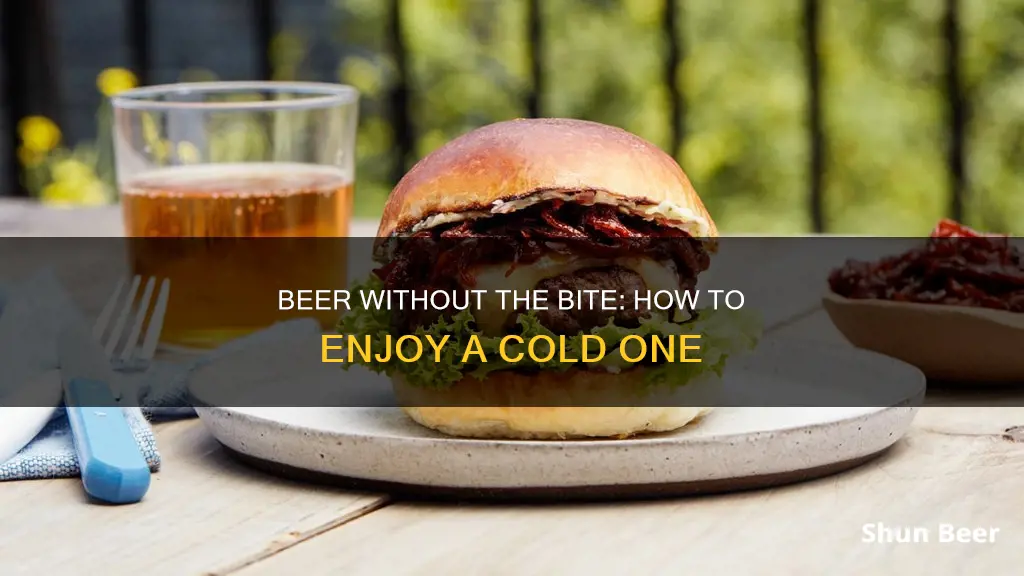
Drinking beer without eating can have several negative consequences. Firstly, alcohol is absorbed more quickly on an empty stomach, leading to a faster rise in blood alcohol level and increased intoxication. This can result in dizziness, nausea, vomiting, loss of motor skills, mood swings, and impaired judgment. Secondly, drinking without eating increases the risk of gastritis, which is the irritation and inflammation of the stomach lining and can lead to internal bleeding. Additionally, drinking on an empty stomach can elevate the risk of developing esophageal cancer, especially for those of Asian descent who have a higher risk of not metabolizing alcohol efficiently. Furthermore, drinking without eating can lead to vitamin and protein deficiencies, malnutrition, and severe health issues such as scurvy, liver failure, and Wernicke-Korsakoff syndrome. Lastly, this behaviour may be indicative of a more serious issue, with terms like drunkorexia being used to describe the hazardous practice of replacing meals with alcohol.
What You'll Learn

You are likely to get drunk faster
Drinking beer on an empty stomach can cause you to get drunk faster. This is because the food in your stomach slows down the rate at which alcohol is absorbed into the bloodstream. When you drink on an empty stomach, the alcohol passes quickly from the stomach into the small intestine, where it is rapidly absorbed. This means that your blood alcohol level will rise more sharply and reach a higher peak than if you had eaten before drinking.
The pyloric sphincter, a valve that connects the stomach and small intestine, closes when you are digesting a meal to keep food in the stomach longer. When the pyloric sphincter is shut, alcohol cannot enter the small intestine immediately and is absorbed into the bloodstream more slowly. Eating before drinking can therefore help to slow down the effects of alcohol and reduce the risk of negative side effects.
Drinking large amounts of alcohol on an empty stomach can be dangerous and can lead to alcohol poisoning. It can also increase the risk of gastritis and other stomach problems, as well as esophageal cancer. It is therefore important to eat something before drinking, especially if you plan on consuming more than one drink. Choosing lower-alcohol beverages, drinking slowly, and alternating alcoholic drinks with water can also help to reduce the risk of negative side effects.
In addition to the immediate health risks, drinking beer on an empty stomach can also lead to long-term health problems. Alcohol provides a lot of calories but few nutrients, so regular drinking without eating can lead to malnutrition and vitamin deficiencies. It can also increase the risk of developing an alcohol use disorder or eating disorder.
Beer After Its Best: Is It Safe to Drink?
You may want to see also

You are at a higher risk of alcohol poisoning
Drinking beer on an empty stomach can be dangerous. Food slows the rate of alcohol absorption by up to 75%, but without it, alcohol is absorbed far more quickly, causing a rapid rise in blood alcohol level. This can lead to alcohol poisoning, which can be fatal.
When you drink on an empty stomach, alcohol passes quickly from the stomach into the small intestine, where it is absorbed into the bloodstream. This intensifies the side effects of drinking, such as dizziness, nausea, vomiting, disinhibition, loss of motor skills, and mood swings. It can also lead to loss of coordination, reduced responsiveness, uncontrolled eye movements, and the inability to speak coherently.
Drinking large amounts of beer without eating can cause alcohol intoxication. Your body absorbs alcohol faster than it can break it down, leading to sudden spikes in blood alcohol concentration. Alcohol poisoning can lead to coma, brain damage, or even death.
How to recognise alcohol poisoning
If you notice any of the following signs of alcohol poisoning in yourself or someone else, seek immediate medical assistance:
- Lack of a gag reflex
- Loss of consciousness
- Difficulty remaining conscious
- Slow or irregular breathing
- Low body temperature
- Dulled or delayed responses
How to recover from drinking on an empty stomach
If you have been drinking on an empty stomach and start to feel unwell, there are several things you can do to recover:
- Drink water to prevent dehydration, replenish your body, and flush out toxins
- Eat foods with carbohydrates, such as bread, cereals, grains, or rice, to normalise blood sugar levels
- Replenish electrolytes with sports drinks, natural fruit juice, or foods like bouillon soup and bananas
- Take pain relievers like aspirin or ibuprofen to treat inflammation and aches
- Get plenty of rest to allow your body to process the alcohol
Wisconson's Teen Beer Drinking Laws Explained
You may want to see also

You may experience stomach problems
Drinking beer on an empty stomach can have several adverse effects on your body. One of the most common issues is stomach problems. Beer can irritate and inflame the lining of your stomach, a condition known as gastritis. The higher the alcohol content and the faster you drink, the more likely you are to experience gastritis. This condition can be severe and even lead to internal bleeding. In some cases, people have ended up in the emergency room due to stomach bleeds caused by drinking on an empty stomach.
Drinking without eating also increases the absorption rate of alcohol in your body. Alcohol is quickly absorbed by the small intestine, and when there is no food in the stomach to slow it down, it passes rapidly into the small intestine, where most of it is absorbed into the bloodstream. This intensifies the side effects of drinking, such as dizziness, nausea, vomiting, disinhibition, loss of motor skills, and mood swings.
In addition to gastritis, drinking beer on an empty stomach can increase your risk of esophageal cancer. Alcohol use, regardless of the amount, contributes to this type of cancer, and the risk may be even higher when drinking without food. If you are Asian, you are at an increased risk as many Asian-Americans do not metabolize alcohol effectively, leading to a 10-fold higher likelihood of developing esophageal cancer.
To minimize the negative side effects of drinking beer on an empty stomach, it is recommended to consume a modest to a substantial snack before drinking. Carbohydrates, in particular, can help slow down the absorption of alcohol. Eating food with your drink will not only reduce the risk of stomach problems but also lessen the intensity of other side effects.
Nursing and Non-Alcoholic Beer: What's Safe?
You may want to see also

You may be at a higher risk of certain cancers
Drinking beer on an empty stomach can have many adverse effects on your body. One of the most serious risks is that of developing certain cancers. According to George F. Koob, PhD, and director of the National Institute on Alcohol Abuse and Alcoholism (NIAAA), "it is well established that alcohol use at any level contributes to esophageal cancer". The risk is suspected to be even higher if drinking on an empty stomach, as the alcohol is absorbed more quickly and directly into the bloodstream.
The pyloric sphincter, a valve that connects the stomach and small intestine, plays a crucial role in slowing down alcohol absorption. When digesting a meal, this valve closes to keep food in the stomach longer, allowing stomach acid to help break it down. With the valve closed, alcohol cannot enter the small intestine immediately and is absorbed more slowly into the bloodstream. However, when drinking on an empty stomach, the alcohol passes quickly from the stomach into the small intestine, where it is rapidly absorbed.
The higher and faster spike in blood alcohol level that occurs when drinking on an empty stomach can lead to a greater risk of developing alcohol-related cancers. This is because the body struggles to process and break down the alcohol effectively, resulting in toxic side effects. The liver normally breaks down alcohol at a rate of one standard drink per hour. However, drinking large amounts of alcohol in a short period on an empty stomach can overwhelm the liver, leading to a buildup of toxins in the body.
Additionally, alcohol use can lead to vitamin deficiencies, which can further increase the risk of certain cancers. For example, folate deficiency caused by alcohol consumption can lead to anemia, which has a compounded negative effect on the heart when coupled with an increased risk of atherosclerosis. Vitamin A deficiency is also common among heavy drinkers, leading to night blindness and immunodeficiencies.
To reduce the risk of alcohol-related cancers, it is crucial to drink in moderation and ensure that you have food in your system before consuming alcohol. Eating a meal a couple of hours before drinking can help slow down the absorption of alcohol and reduce the spike in blood alcohol level. This will give your body more time to process and break down the alcohol, reducing the toxic effects on the body.
Reindeer, Beer: A Safe Holiday Treat or Not?
You may want to see also

You may be at risk of malnutrition
Drinking beer without eating can lead to malnutrition and a host of other health issues. Beer contains calories, but these are empty calories, devoid of essential nutrients, vitamins and minerals.
Drinking on an empty stomach can cause a rapid rise in blood alcohol levels, leading to faster intoxication and an increased risk of alcohol poisoning. Alcohol is quickly absorbed by the small intestine, and when there is no food in the stomach, it passes through to the small intestine more swiftly, intensifying the side effects of drinking. These can include dizziness, nausea, vomiting, disinhibition, loss of motor skills and mood swings.
Drinking without eating also increases the risk of gastritis, where the lining of the stomach becomes irritated and inflamed, which can lead to internal bleeding. This can be life-threatening.
In addition, drinking without eating increases the risk of esophageal cancer. Alcohol use at any level contributes to this, and the risk is suspected to be even higher on an empty stomach.
Longer-term, drinking beer without eating can lead to vitamin and protein deficiencies. This can cause Wernicke-Korsakoff syndrome, also known as beriberi, which leads to amnesia, confabulations and psychosis. Folate deficiency can cause anemia, which has a compounded negative effect on the heart when coupled with an increased risk of atherosclerosis. Scurvy can develop after 2-3 months of vitamin C deficiency, leading to bleeding gums, loose teeth, easy bruising and excess bleeding in injuries. Vitamin A deficiency causes night blindness and immunodeficiency.
Finally, a diet of pure alcohol can lead to almost any vitamin deficiency, and these can have severe and harmful effects on the body.
Beer and Gas: Is There a Link?
You may want to see also
Frequently asked questions
Drinking beer on an empty stomach can lead to faster intoxication and unpleasant side effects such as nausea, vomiting, dizziness, and loss of coordination. It can also cause serious health issues like gastritis and increase the risk of developing alcohol use disorder or eating disorders.
Alcohol is absorbed more quickly into the bloodstream when there is no food in the stomach to slow down its passage into the small intestine, where most of it is absorbed. This results in a rapid rise in blood alcohol level.
Signs of alcohol intoxication include loss of coordination, difficulty remaining conscious, slow or irregular breathing, low body temperature, and dulled or delayed responses. If you or someone you know exhibits these symptoms, seek immediate medical attention as it can be life-threatening.
To recover, it is recommended to drink water, eat carbohydrates, replenish electrolytes, and get plenty of rest. However, it is important to note that drinking water will not cure alcohol poisoning, and seeking medical help is crucial in severe cases.
Regularly drinking beer without eating can lead to vitamin and protein deficiencies, malnutrition, liver failure, and an increased risk of developing serious health conditions. It is crucial to consume a balanced diet and not rely solely on beer for nutrition.







